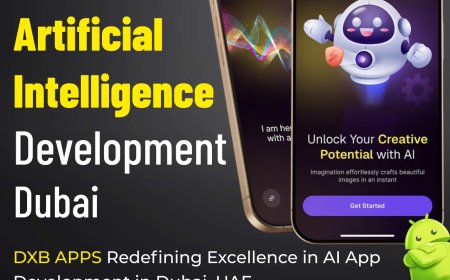How Artificial Intelligence Is Changing Everyday Life
Artificial Intelligence (AI) is no longer just a futuristic concept seen in sci-fi movies—it’s a powerful force transforming the way we live, work, and connect with the world around us.

Artificial Intelligence (AI) is no longer just a futuristic concept seen in sci-fi moviesits a powerful force transforming the way we live, work, and connect with the world around us. From voice assistants that answer your questions to personalized shopping recommendations, AI is quietly embedded in our daily lives. Whether youre a student wondering can you help me do my assignment on AI? or simply curious about how it all works, this article will help you understand the incredible impact of AI on everyday life.
1.AI in Communication: Smarter Conversations
Chances are, you've already interacted with AI without realizing it. When you use voice assistants like Siri, Google Assistant, or Alexa, youre tapping into natural language processing (NLP), a key subfield of AI. These systems can understand your speech, analyze it in real time, and respond with relevant information or actions.
Even messaging apps use AI. Autocorrect, predictive text, and chatbots are all AI-powered features designed to make communication smoother and faster.
Impact: AI reduces friction in daily communication, helping people interact more efficiently and across language barriers.
2.AI in Entertainment: Personalized Content Everywhere
Ever noticed how Netflix, YouTube, or Spotify seems to know exactly what you want to watch or listen to? Thats AI in action.
These platforms use machine learning algorithms to analyze your preferences, watch history, and behavior patterns. Based on that data, they recommend shows, videos, or songs tailored specifically to your interests.
Impact: AI creates a more personalized entertainment experience, helping you discover content youll likely enjoysometimes even before you know you want it.
3.AI in Education: Learning Gets Smarter
AI is also transforming how students learn and teachers teach. Educational platforms like Duolingo, Khan Academy, and Coursera use AI to customize lessons, provide instant feedback, and track progress. AI-driven tools can adjust the difficulty level of questions based on your performance.
For students under pressure, there are even AI writing assistants and tutoring platforms. And yes, if youre thinking, Can you help me do my assignment?many AI tools now provide research assistance, essay structure suggestions, and grammar corrections.
Impact: AI supports personalized learning, improves student outcomes, and gives both students and educators more flexible, effective tools.
4.AI in Shopping and Retail: Smarter Choices, Faster Checkout
E-commerce platforms like Amazon and eBay use AI to recommend products based on your browsing history and purchases. When you see Customers who bought this also boughtthats AI at work.
In physical stores, AI helps with inventory management, self-checkout systems, and even facial recognition for security. Some stores are testing cashier-less experiences where sensors and AI track what customers pick up and charge them automatically.
Impact: AI enhances shopping convenience, speeds up transactions, and makes product discovery more efficient.
5.AI in Healthcare: Saving Lives with Data
Healthcare is one of the most promising fields for AI innovation. AI-powered tools help doctors detect diseases faster and more accurately. For example, AI can analyze medical images to spot early signs of cancer or identify anomalies in heart scans.
Apps now use AI to monitor symptoms, remind patients to take medication, and even provide mental health support through virtual therapy chatbots.
Impact: AI improves diagnosis, treatment, and patient monitoring, making healthcare more accessible and responsive.
6.AI in Transportation: Driving Toward the Future
Self-driving cars are one of the most talked-about applications of AI. Companies like Tesla, Waymo, and Uber are working on vehicles that can navigate roads, avoid accidents, and optimize fuel efficiencyall powered by machine learning, sensors, and real-time data analysis.
Even if you're not in a self-driving car yet, AI is still at workwhether its through traffic prediction in Google Maps or ride-matching in apps like Uber and Lyft.
Impact: AI is making travel safer, more efficient, and increasingly autonomous.
7.AI in Finance: Smarter Money Management
AI helps banks and financial institutions detect fraud, manage risk, and offer customer service through chatbots. Apps like Mint or Cleo use AI to analyze your spending habits and give budgeting tips.
AI also powers robo-advisorsautomated platforms that help you invest money based on your risk profile and financial goals.
Impact: AI brings greater convenience and security to personal finance and investment.
8.AI at Home: Smarter Living Spaces
Smart homes are becoming more common, with devices like thermostats, lights, and security cameras all connected to a central AI system. AI can learn your preferences and adjust your home environment accordinglylike turning off the lights when you leave or setting the perfect room temperature before you arrive.
Impact: AI-powered homes offer comfort, energy efficiency, and peace of mind.
Final Thoughts
Artificial Intelligence is no longer a distant conceptits a daily reality shaping the world around us. From the way we communicate and learn to how we shop and stay healthy, AI is integrated into nearly every part of modern life. And its influence will only grow in the years to come.
So, whether you're fascinated by AIs role in education or asking, Can you help me do my assignment on how AI works?remember that this is one of the most exciting and important technologies of our time. Understanding how AI affects your daily life not only helps you stay informed, but also prepares you for a future where these systems will be even more integrated into our routines.





































